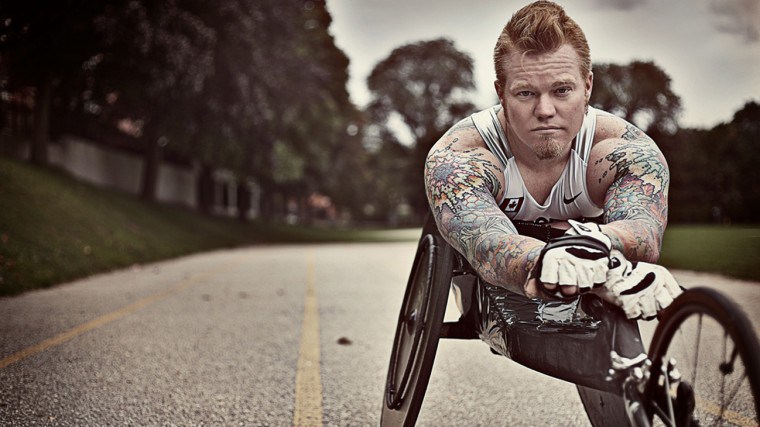Jeff Adams knows there are 1,776 steps to the top of the CN Tower in Toronto.
He should know. In 2002, he climbed every one of them in his wheelchair. It took him six hours to get to the top in a wheelchair designed to move in only one direction. Forward. Kind of like how he has led his life.
The five-time Paralympian and six-time world champion in wheelchair racing has used the power of positive thinking and determination to move beyond his disability and triumph as a competitive athlete, motivational speaker and role model.
The 47-year-old Adams is coming to Prince George Thursday night at 7 at the Civic Centre as the keynote speaker at an event sponsored by Integris Credit Union, in conjunction with Canadian Cancer Society Cops for Cancer Tour de North, Engage Sport North and Canadian Tire.
Adams developed cancer as an infant and underwent radiation therapy which burned his spinal cord. For the next eight years he led a normal life until a playground accident when he was tackled caused an injury which eventually led to the loss of the use of his legs when he was nine.
"It was very experimental radiation therapy and it saved my life, but at the same time, and we didn't know at the time, the radiation burned my spine," said Adams. "So I walked away from the cancer therapy but about eight years later one of the little burns had some secondary involvement and it burst and caused the spinal cord injury from the bleeding."
Adams went on to compete in six consecutive Paralympics from 1988 to 2008, an occupation he calls, "The best job I ever had."
In Seoul in 1988 he won two bronze medals (800 metres and 1500m), was a two-time silver medalist in Barcelona in 1992 (880m and 4x400m relay) and won his first gold medal in 1996 in Atlanta (800m) followed by two gold medals in 2000 in Sydney (800m and 1,500m). But the most satisfying race came right after the Sydney Games at the 2001 IAFF world championships in Edmonton, where Adams won the silver medal in the 1,500m wheelchair race, the only medal won by a Canadian at the event.
"Sydney was my best in terms of raw performances and Edmonton was my home country worlds and just the fact the home crowd was going to be behind me, coming off the best year of my career, it was a really special event," said Adams.
"That was probably the tightest race I've ever been in. First to last was separated by 88 hundredths of a second and the guy who won, won by three hundredths."
Adams has worked as a TV journalist for CBC, covering several Paralympic events and he's seen the evolution of large-scale events for athletes with disabilities like the Paralympics and 2019 world para nordic championships, which will be hosted at Otway Nordic Centre in Prince George next February.
"When I first started, the first Paralympics was in 1988 in Korea and we didn't have any coverage and nothing on TV and that sort of grew as I progressed through my career," Adams said. "London was probably the pinnacle, it was completely integrated and they had sides of buildings with faces of the Paralympic athletes on them."
Adams competed in his last Paralympics in Beijing in 2008, the first year Paralympics were mandated for the Olympic Games hosts. He had been to China five years earlier for a marathon, where he learned people with disabilities were never given a chance to showcase their talents. The Paralympics brought a sudden and dramatic change in the country's social policy.
"They went from state policy of denying the existence of people with disabilities (before Beijing won the Olympic bid) to celebrating athletes with disabilities in stadiums full of people," said Adams. "You talk about the erasure of people with disabilities or vulnerable groups of people and that was it to the furthest extent you could take it. People would be hidden away in villages and the disability was really shunned and it went from that to finding people with disabilities and recruiting them for teams. In the true Chinese way, they wanted to be the best at it, so they went from zero to 100."
Adams works as global spokeperson for multinational corporations and continues to push for better accessibility for wheelchair users. Despite improvements in building codes, he says no Canadian province mandates wheelchair access for all buildings.
Tickets for the Adams' presentation can be purchased online at bit.ly/2GNy2Ff or will be available at the door. Admission is $20.



